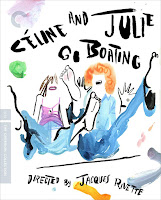Center Stage
(Film Movement Classics)
Taiwanese director Stanley Kwan made this intelligent 1991 biopic about Chinese silent-era actress Ruan Lingyu, who died by suicide at age 24. Kwan fascinatingly pieces together the remnants of her life, career and legacy by layering his film with interviews with former colleagues, lush recreations of scenes from her films—including some which are lost—and discussing her artistry with Maggie Cheung, who commandingly plays her. It’s challenging and lengthy (2-1/2 hours) but utterly absorbing, with an emotionally shattering final sequence that merges sorrowful film and personal history.
The Beggar’s Opera
(Opus Arte)
British composer John Gay’s opera, which he wrote in 1728, skillfully weaved its satirical story of charismatic petty criminal Macheath around and through then-popular tunes of the day (although the best known version is Weill and Brecht’s Threepenny Opera, created two centuries later). Robert Carsen’s 2018 Paris staging updates the street lingo—lots of f-bombs are thrown in, to no discernible effect—but unnecessarily underlines Gay’s incisive original with a rather desperate 21st century sensibility. Happily, there are fine musical contributions from conductor William Christie and his Les Arts Florissants ensemble as well as Benjamin Purkiss’ Macheath and Kate Batter’s Polly Peachum and Emma Kate Nelson’s Jenny, two of Macheath’s many conquests. There are first-rate hi-def video and audio.
(Criterion Collection)
French director Jacques Rivette’s 3-1/4 hour shaggy-dog tale of two 20-something Parisian women—one a magician (bohemian), the other a librarian (straitlaced)—who find themselves in a mansion where a murder plot is reenacted again and again is loosely-structured, paper-thin and amateurish in execution—Rivette even manages to make the delightful Marie-France Pisier look ordinary! Still, many consider this a masterpiece, so obviously your mileage may vary. Criterion’s two-disc set houses a spiffy hi-def transfer and many extras, including critic Adrian Martin’s audio commentary; Claire Denis’ two-plus hour documentary, Jacques Rivette: Le veilleur; archival interviews with Rivette, Pisier, Berto and Labourier; and new interviews with actress Bulle Ogier and actor/producer Barbet Schroeder.
(Warner Archive)
It’s too bad that this 1958 adaptation of the hit stage musical has dated so badly, especially in the cheeky but toothless humor of the devil needing a sexpot to keep his baseball protégé in line. Ray Walston is hammy but unfunny as Mr. Applegate (i.e., the devil), while Gwen Vernon surprisingly shines only in her infrequent song-and-dance numbers, the best a really goofy but limber mambo with choreographer (and soon-to-be husband) Bob Fosse. Otherwise, directors George Abbott and Stanley Donen’s frothy concoction may disappoint fans of both baseball and musicals. At least there’s a vibrant new hi-def transfer, but no extras.
(Warner Archive)
Who else but Mario Lanza—the operatic voice of the mid 20th century—would play Enrico Caruso, the greatest singing voice of the early 20th century, in Richard Thorpe’s hokey but entertaining 1951 biopic that takes so many liberties with the facts that even viewers who don’t know the real story might say, “wait a minute—did it happen like that”? Even so, Lanza singing real opera excerpts and the charming Ann Blyth as Caruso’s wife Dorothy are enough to make it watchable, even for the skeptical or uninitiated. The Technicolor visuals pop nicely in Warner Archive’s sparkling hi-def transfer; the lone extra is a 2005 documentary, Mario Lanza: Singing to the Gods.
(Naxos)
For Israeli composer Chaya Czernowin, writing an opera about the most heartfelt romantic coupling means minutely applying clinical notes and soundscapes to make for a disorienting if occasionally illuminating experience. Director Claus Gluth’s 2019 Berlin production piles on visual flourishes that might have worked wonderfully in the theater (split screens, film and video, superimposed imagery) but fall flat presented on this disc, so Czernowin’s multisensory work never reaches its objective. Still, it’s expertly done by a dizzying array of singers, musicians and technicians, and there’s impeccable hi-def video and audio.
Hilary Hahn—Paris
(Deutsche Grammophon)
American violinist Hilary Hahn’s latest recording may have her usual scintillating performances of two towering violin works—Ernest Chausson’s elegant Poeme and Sergei Prokofiev’s brilliant First Violin Concerto—but the main draw is the world premiere recording of Finnish master Einojuhani Rautavaara’s final work, 2016’s Deux Serenades. Written for Hahn—who played the first performance onstage in 2019—the Rautavaara piece plays to her strengths with its sheer emotional power. Especially when played so beautifully by Hahn and her fine accompanists, conductor Mikko Franck and the Orchestre Philharmonique de Radio France, Rautavaara couldn’t have asked for a lovelier epitaph.
(Deutsche Grammophon)
John Williams has written so many iconic scores for dozens of films—mostly Steven Spielberg’s but also the Star Wars and Harry Potter series, among many others—that it would seem a fool’s errand to try and jam excerpts into a single concert. But this two-disc recording of a Vienna Philharmonic performance Williams himself conducted in January 2020 does very well as a terrific overview of his monumental career. Williams’ music for several Spielberg films gives the musicians a chance to shine, with Close Encounters and E.T. as the orchestral highlights. Violin superstar Anne-Sophie Mutter provides exquisite, stylish soloing on several of Williams’ less well-known scores, like Cinderella Liberty, The Witches of Eastwick and Sabrina, and she effortlessly handles the yearning, fragile melodies of Schindler’s List. The finale, the exuberant Imperial March from Star Wars, rounds out an exceptional set.
(LSO Live)
Russian Sergei Rachmaninoff (1873-1943) wrote big, full-bodied, unabashedly Romantic music that’s often criticized as too sentimental or—even worse—popular. But his most enduring works are precisely in that mold, like his splashy piano concertos—with one memorable melody after another—the Rhapsody on a Theme of Paganini and the taut, well-paced Second Symphony (1908). Simon Rattle and the London Symphony Orchestra give this marvelous symphony a vigorous workout full of lyricism and intensity.









No comments:
Post a Comment